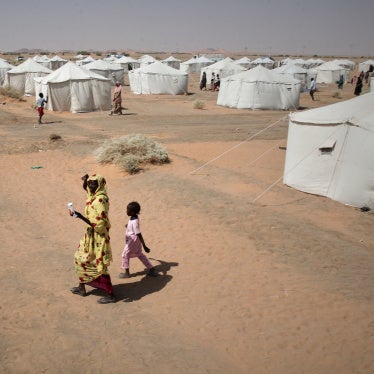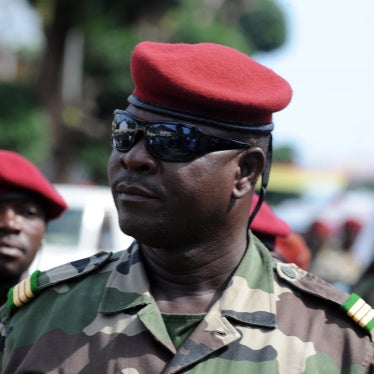The most brutal U.S.-backed dictator you’ve never heard of—Hissène Habré of Chad—has just been indicted in Belgium on charges of mass murder and torture. His indictment was a decisive breakthrough in a judicial chess game pitting the former central African dictator against a Chadian torture victim who did not give up and a New York “dictator hunter" at Human Rights Watch.
Souleymane Guengueng, a modest and deeply religious civil servant who watched hundreds of his cellmates perish from torture and disease during two years in Habré’s prisons, took an oath before God that if he ever got out of jail alive, he would bring his tormentors to justice. When Habré fell in 1990 and fled to Senegal, Guengueng used his considerable charm to persuade still-frightened victims to form a group to prepare a case against the former dictator. Habré is thought to have killed tens of thousands of people in this former French colony. However, the government that’s been in power ever since has brought on many of Habré’s henchmen and given up on his extradition, while the former tyrant has lived in quiet luxury in Senegal.Then, after former Chilean dictator Augusto Pinochet was arrested in London, Reed Brody of Human Rights Watch took an interest in the Habré case. Brody, whose legal brief helped persuade the House of Lords to strip Pinochet of his immunity, was looking to extend the “Pinochet precedent” to other abusive tyrants. Brody sent two secret missions to Chad to meet Guengueng and gather evidence. In a carefully timed surprise operation, Brody and Guengueng—together with a coalition of Chadian, Senegalese, and international activists—filed charges against Habré in Senegal in January 2000. Within a week, Habré was under house arrest, charged with crimes against humanity.
Back in 1981, Ronald Reagan saw Habré, then a local warlord, as a man who could be used to help contain the ambitions of Muammar el-Qaddafi of Libya, Chad’s expansionist northern neighbor. By then, Habré had already earned a reputation for extreme brutality, once kidnapping a French anthropologist in 1974 and then murdering the man the French government sent to negotiate her release. Even so, Washington could not pass up a chance to “bloody Qaddafi’s nose,” as Alexander Haig reportedly put it.
Habré’s march on Chad’s capital, N’Djamena, in 1982 was buoyed by generous covert U.S. support. Once Habré took power, the United States later provided him with tens of millions of dollars in military aid each year and gave financial and logistical support to his secret police while it engaged in torture and other atrocities. The United States also used a clandestine base in Chad to train captured Libyan soldiers whom it was organizing into an anti-Qaddafi force that was said to be armed by another Qaddafi enemy as well: Saddam Hussein.
To build the case against Habré, Brody and Human Rights Watch’s Olivier Bercault made frequent trips to Chad. Once, they stumbled onto the abandoned archives of Habré’s personal Gestapo, the feared “DDS.” Tens of thousands of documents strewn on the floor detailed how Habré’s regime attacked rival ethnic groups and organized the repression of political opponents. They also describe U.S. training programs for DDS agents, including a course outside of Washington that was attended by some of the DDS’ most feared torturers. These files are now in a searchable database and a CD-ROM compiled by Human Rights Watch in New York.
Habré used some of the millions he had stolen from Chad’s treasury to get the case in Senegal dismissed. But by then, Brody, Guengueng and their colleagues had already filed charges against Habré in Belgium, whose anti-atrocity law allowed its courts to hear cases from all over the world. A Belgian judge took up the case and carried out a landmark mission to Chad, where he interviewed witnesses and visited Habré’s prisons and mass graves together with Guengueng and other former detainees. Meanwhile, Brody got the United Nations to persuade Senegal’s president to keep Habré under guard pending an extradition request from Belgium.
When the ambitious Belgian law crumbled under a U.S. attack in response to charges brought against senior U.S. officials, Guengueng and Brody dashed to Brussels. In meetings with cabinet ministers and legislative leaders, they won a grandfather clause for the Habré prosecution, convincing the authorities that Belgium could not abandon the Chadian victims to whom it had given hope.
Now, nearly fifteen years after Habré was deposed and five years after he was first arrested in Senegal, a Belgian judge has indicted Habré and is seeking his extradition from Senegal, whose president has said that he has no objections to handing him over to Belgium. Habré’s extradition would be a wake-up call to dictators in Africa and elsewhere, warning them that if they commit similar atrocities, they could also be brought to justice one day. As well as serving as another feather in Brody’s dictator-hunting cap, bringing Habré to justice would allow Souleymane Guengueng to fulfill his oath.








